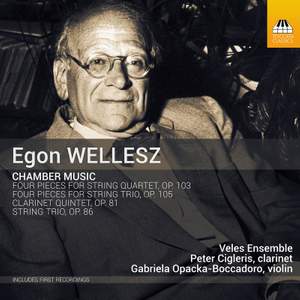
Egon Wellesz (1885-1974)
Clarinet Quintet Op 81 (1959)
String Trio Op 86 (1962)
Vier Stücke for String Quartet Op 103 (1969)
Vier Stücke for String Trio Op 105 (1971)
Veles Ensemble
Peter Cigleris (clarinet)
Gabriela Opacka-Boccadoro (violin)
rec. 2020, Holy Trinity Church, Weston, UK
Reviewed as a digital download from a press preview
Toccata Classics TOCC0617 [74]
That the Viennese composer Egon Wellesz is better known as a scholar than as a composer is evidenced by the fact that three of the works included on this splendid, bracing CD are first recordings. An émigré forced to flee the Nazis, he ended his days as an academic at Lincoln College, Oxford. It was during this long second half to his career that all these chamber works were written. Whilst he studied with Schoenberg, he was by no means an acolyte and never embraced his teacher’s 12 tone system, preferring the freedom offered by atonality.
In many ways the music chosen by the Veles Ensemble both confirms and confounds expectations. It is severe, terse music full of the technical science of the art but it is also richer, more imaginative and in places, even more seductive than I expected.
The notes by Wellesz’ student, Bojan Bujić, describe his style in terms of alternating blocks of chords generally combined with some distinctive rhythmic figure and more melodic elements. He further comments that these basic materials undergo continuous development. Finally, he remarks that the two works entitled Vier Stücke represent a completion of a circle back to Wellesz’ earliest works under the influence of the highly condensed style of Schoenberg’s piano music.
There are many other audible influences, not least Bartók, but I was struck by the surprising similarities to the roughly contemporaneous late quartets of Shostakovich. Like the music of the Russian, these are mostly dark scores though like that other ambivalent Schoenberg enthusiast, Elisabeth Lutyens, the rigour of the music gives it fantastic energy which offsets the painful shadows.
The more mellifluous Clarinet Quintet provides a good starting point for getting to know the world of Wellesz’ music. Bujić remarks that the composer attempted to recreate his Viennese home in his more cramped Oxford accommodation and this particular piece, even more than the others included, seems haunted by memories of his homeland. There is a gypsy edge to the clarinet writing that evokes Brahms’ masterpiece for the same instruments. But Mahler and Webern crowd into the music also. Wellesz the academic holds such memories on a tight formal rein which in some ways makes them more moving, stripped as they are of all sentimentality. The whole enterprise is helped by the warm, liquid sound of Peter Cigleris’ clarinet – no shrieking or acid tone here!
The success of this recording lies in the warm responsiveness of the Veles Ensemble and colleagues’ playing. There is no sense of this being atonal cod liver oil listened to because it is good for us. They find the melodies in the music and the passion in the crunching chords. Above all, they understand the subtle varieties of texture that enliven even the most concentrated of these movements. Whilst they don’t shy away from its austerity, the music never sounds dry or academic. Toccata’s sound allows just enough space to let the ghosts gather at its margins – just listen to the twittering night birds of the third of Op 105 set. Indeed, all of these last pieces for quartet and trio seem as if they are holding off some terrible, even greater sadness lurking just out of earshot.
This collection does Wellesz’ music proud and fills another gap in the musical history of the last century. The quality of the music reminds us how much got overlooked during that strange partisan era that now needs reclaiming. The performances take us deep into Wellesz’ sound world which is a dark but gripping place.
David McDade
Previous review: Gary Higginson (March 2023)
Help us financially by purchasing from




















